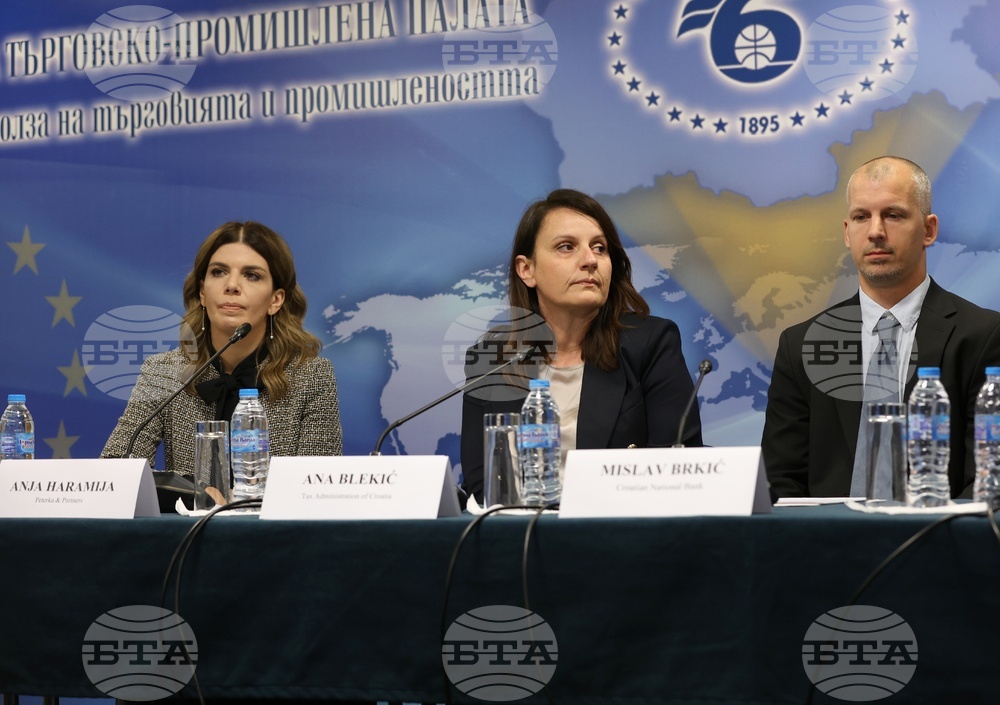site.btaThanks to Euro Adoption, Croatia Has One of Fastest Growing Economies


At a conference on the risks and challenges of the euro changeover in Croatia's experience, representatives of Croatian financial institutions reviewed their country's legislative framework upon the euro changeover.
The event took place here on Tuesday and was arranged jointly by the Bulgarian Chamber of Commerce and Industry (BCCI) and the Bulgarian-Croatian Business Club and in cooperation with the Head of the Bulgarian Trade and Economic Affairs Office in Zagreb Mirela Taseva.
Mislav Brkic of the Croatian National Bank said that his country's euro changeover transition took two weeks, and during that period people were able to use both kune and euro for cash payments, while only euro cashless payments were possible after all bank accounts were translated into euro as from January 1, 2023.
“Businesses, too, had to exchange kune for euro before January 1, so that they could start settling in euro as from the first day of the two-week transition period during which they accepted kune but returned change in euro. Everybody coped, only some small businesses were unable to catch up and returned kune as well, but everything was on track after the end of the transition period," Brkic pointed out.
He stressed the importance of checks for speculative price rises after the adoption of the euro.
To address this situation, Croatia introduced a code of ethics under which the businesses committed to comply with that code and not raise prices. They were issued a sticker to place in their shop windows to make customers aware that these retailers comply with the code and the prices are translated correctly.
Brkic argued that countries like Croatia and Bulgaria have the most to gain from joining the eurozone. Some of the benefits manifest themselves immediately, such as regarding euro-denominated external debts. "Only when you adopt the euro you are totally safe. Say, if the exchange rate [of the national currency] collapses, you are safeguarded," he pointed out, adding that by adopting the euro the country become safer for the markets, and there is a positive impact on tourism, too.
Ana Blekic, Head of the Business Solution and Implementation Department in the Division for Application Solution and ICT System in the Central Office of Croatia's Tax Administration, said that preparations for the introduction of the euro in her country began in 2021 and went through three phases. In the first phase, amounts were indicated in both currencies in their system with the euro used for reference only. The second phase began on January 1, 2023, when the two currencies continued to be cited, but the kuna was just for reference. As from January 1, 2024 the amounts in their system have been in euro only.
In Blekic's words, balances and accounts were translated at the fixed exchange rate and only sums below 1 eurocent were not exchanged. Citing amounts in both kune and euro continued for 16 months.
According to Goran Saravanja, Chief Economist at the Croatian Chamber of Economy (HGK), his country coped with the challenges posed by the introduction of the euro because of the right coordination between the central bank and the ministries. He emphasized that the euro changeover had only a favourable impact on the business environment. "At the beginning, business incurred higher expenditures because of the currency exchange, but now it enjoys lower charges which offsets this," the expert explained. He added that Croatia has one of the fastest growing economies thanks to the adoption of the euro.
Anja Haramija, Senior Associate at the Peterka & Partners law firm, said that a large part of the Croatian laws that mentioned kune had to be amended. These laws were divided into two groups: some had to be revised before the introduction of the euro, and other after that.
Haramija recommended to companies to get thoroughly familiar with the documents on the introduction of the euro as soon as possible and to start a harmonization process, and once the euro is adopted to go through all their accounts so as to make sure that they are translated correctly. Companies that handle cash on a daily basis are recommended to exchange a larger sum in euro so that transactions would proceed seamlessly and to train their staff to work with annexes and future contracts in euro terms only.
/MR/
news.modal.header
news.modal.text